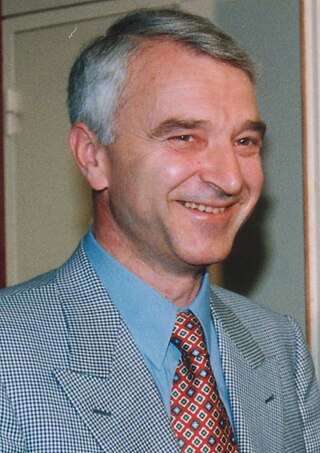
Ismail Kadare was an Albanian novelist, poet, essayist, screenwriter, and playwright. He was a leading international literary figure and intellectual. He focused on poetry until the publication of his first novel, The General of the Dead Army, which made him famous internationally.
Albanian literature stretches back to the Middle Ages and comprises those literary texts and works written in Albanian. It may also refer to literature written by Albanians in Albania, Kosovo and the Albanian diaspora particularly in Italy. Albanian occupies an independent branch within the Indo-European family and does not have any other closely related language. The origin of Albanian is not entirely known, but it may be a successor of the ancient Illyrian language.
Rexhep Qosja is an Albanian writer, literary critic and Professor at University of Prishtina. He is a prolific literary critic and literary historian of Albanian literature. As a writer he is mostly known for his 1974 novel 'Death Comes to Me from Such Eyes', translated into multiple languages.

Ibrahim Aqif Biçakçiu was an Albanian landowner and Axis collaborator, Chairman of the Provisional Executive Committee from September 14 to October 24, 1943, and Prime Minister of Albania from September 6 to October 26, 1944 during the Nazi occupation.

Bujar Bukoshi was the prime minister of the Republic of Kosova from 1991 to 2000. He served as the Minister of Healthcare in Kosovo.
Bilal Xhaferi, often referred to as Bilal Xhaferri, was an Albanian writer and political dissident against the Albanian communist regime. He is seen as the representative poet of the Albanian Chameria.

Gani Bobi was an Albanian philosopher and sociologist from Kosovo.

Albanian epic poetry is a form of epic poetry created by the Albanian people. It consists of a longstanding oral tradition still very much alive. A good number of Albanian epic singers can be found today in Kosovo and northern Albania, and some also in Montenegro. The Albanian traditional singing of epic verse from memory is one of the last survivors of its kind in modern Europe, and the last survivor of the Balkan traditions.

Shote Galica was a Kachak Albanian insurgent. She has been declared a People's Heroine of Albania.
Esad Mekuli was an Albanian poet, critic and translator. He was the first president of the Academy of Sciences and Arts of Kosovo. Robert Elsie considered him the father of modern Albanian poetry in Yugoslavia, and his influence in Kosovo remains immense.
Kasëm Trebeshina was an Albanian resistance fighter, actor, translator, communist prosecutor and writer. He was member of national resistance during World War II, part of the National Liberation Movement. He was one of the founders of the notorious communist secret police Sigurimi.
Helena "Elena" Kadare is an Albanian screenwriter, translator and author of short stories and novels. One of the latter, 1970's Një lindje e vështirë, is the first novel by a woman to have been published in Albania. A Woman from Tirana (1990) is the novel of Kadare's that is perhaps her most widely read.
Skënder Rizaj was a Kosovar Albanian scholar and historian born in Peja, Kingdom of Yugoslavia). He specialised in the Ottoman period of Balkan's history.
The literature of Kosovo is composed of literary texts written in Albanian, Serbian, Bosnian, and Turkish, specifically by authors of Kosovo. Kosovo produced several prominent writers in the Ottoman era. However, Ottoman authorities banned the written use of the Albanian language until 1912. This policy continued during Serb rule until the outbreak of World War II.

Gani Bey Kryeziu was a Kosovo Albanian anti-communist resistance fighter.
Nijazi Ramadani is a Kosovar Albanian poet, novelist and literary critic.
The Kadare Prize, established in 2015, is a literary prize awarded annually to a work by an Albanian author. It is named in honour of the Albanian writer Ismail Kadare. Winners are awarded 10,000 euros.

The Palace of Dreams is a 1981 novel by the Albanian writer Ismail Kadare. Set ostensibly in the Ottoman Empire, but in a deliberately imprecise past shaded by myth and intended to represent the modern totalitarian state, The Palace of Dreams follows the rapid rise of Mark-Alem, a young Ottoman Albanian related to the powerful Köprülü family, within the bureaucratic regime of the title palace, a shady ministry whose objective is to gather, examine and interpret the dreams of the empire's subjects in order to uncover the master-dreams, which are believed to show the future destiny of the Sultan and the state.

Galica is a village administratively located in the Municipality of Vushtrri, Kosovo, but geographically situated in the Drenica region. The village covers an area of 443 hectares and is known for its numerous microtoponyms such as Katuni i Moçëm, Livadhi i Kolë Bibës, Kroni i Bajramit, among others, which testify to the village's history and culture.








